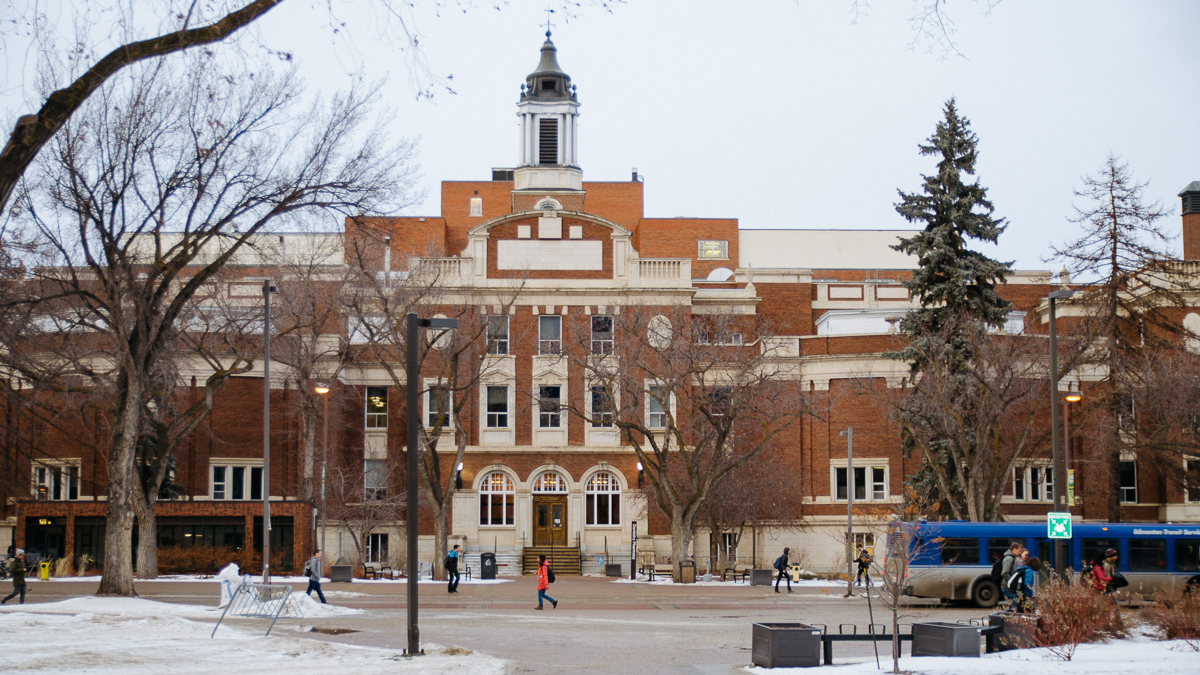SU Elections 2020 “Myer Horowitz” Forum Recap
The "Myer Horowitz" forum featured candidates from all races, as well as all referendums
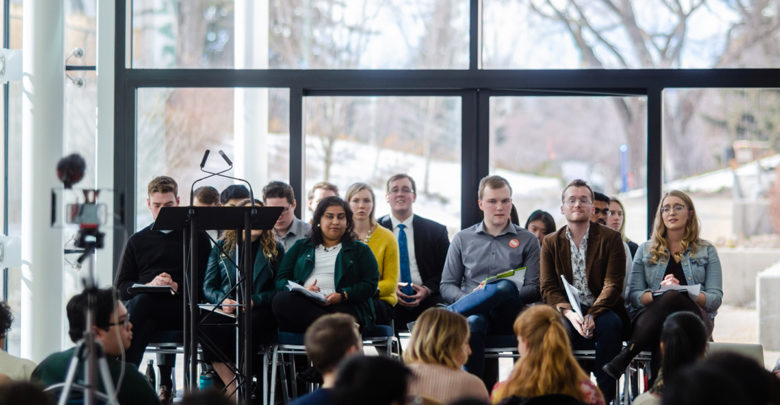 Helen Zhang
Helen ZhangThe sixth forum of the University of Alberta Students’ Union 2020 election saw candidates mostly field questions from the audience.
Some of the highlights of what was discussed during the forum included:
- President: gaining students’ trust within advocacy and activism
- Vice-president (student life): candidates already getting traction on combating sexual violence
- Vice-president (academic): The vulnerability of being VP academic and fighting to ensure academic rights are met
- Vice-president (operations and finance): getting at-large students involved in SU operations
- Vice-president (external): advocating for students when alliances want something different
- Board of Governors Representative: back-up plans for when BoG doesn’t vote in favour of students
Questions about presidential candidates commitment to student advocacy
A hot topic this election, presidential candidates were grilled about how they would better advocate for students.
In terms of steps the Students’ Union could take to better organize, Joel Agarwal, sixth-year biology student and current vice-president (academic), said that he would look into hiring an individual to solely oversee student mobilization. He also said the Students’ Union should join with other bodies on campus, such as the Non-Academic Staff Association (NASA) to unify the campus voice.
“It’s pathetic when we have a protest and 20 students show up,” Agarwal said. “I think that is an issue we need to be addressing with more tenacity.”
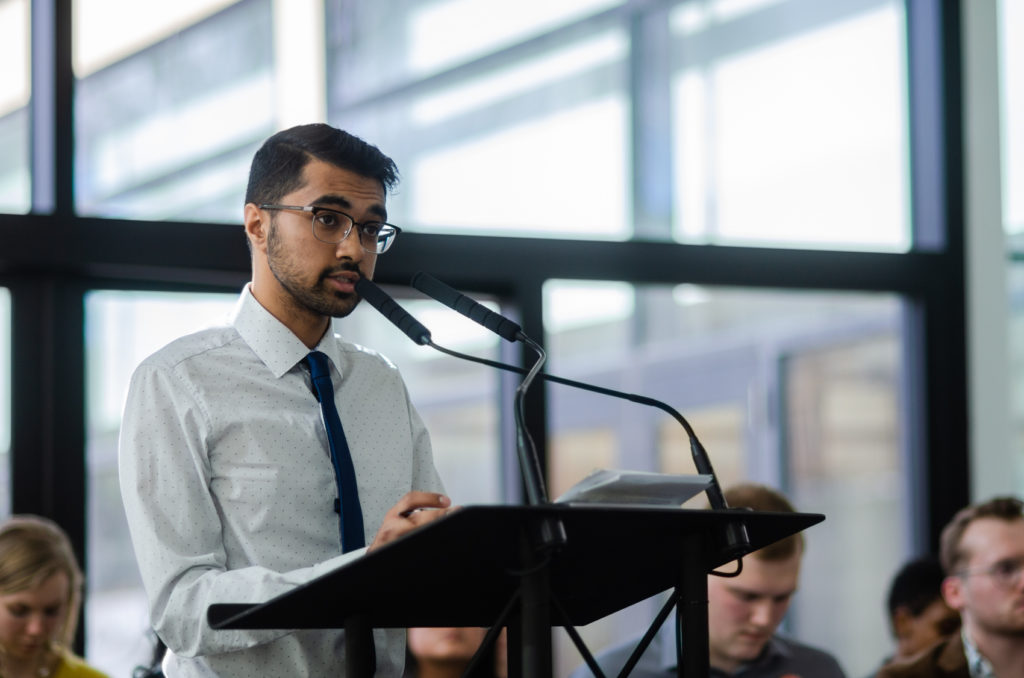
Similarily Luke Statt, fifth-year business student and current vice-president (operations and finance), also said he would work to hire someone dedicated to organizing student strikes. Statt said it’s not that students don’t care about protests; they just don’t hear about them. He said he would try to make the Students’ Union’s advocacy more accessible.
“I’ve come to recognize… that grassroots movements and Student Representative Associations should have a place at the table with the Students’ Union in helping to guide these protests,” he said.
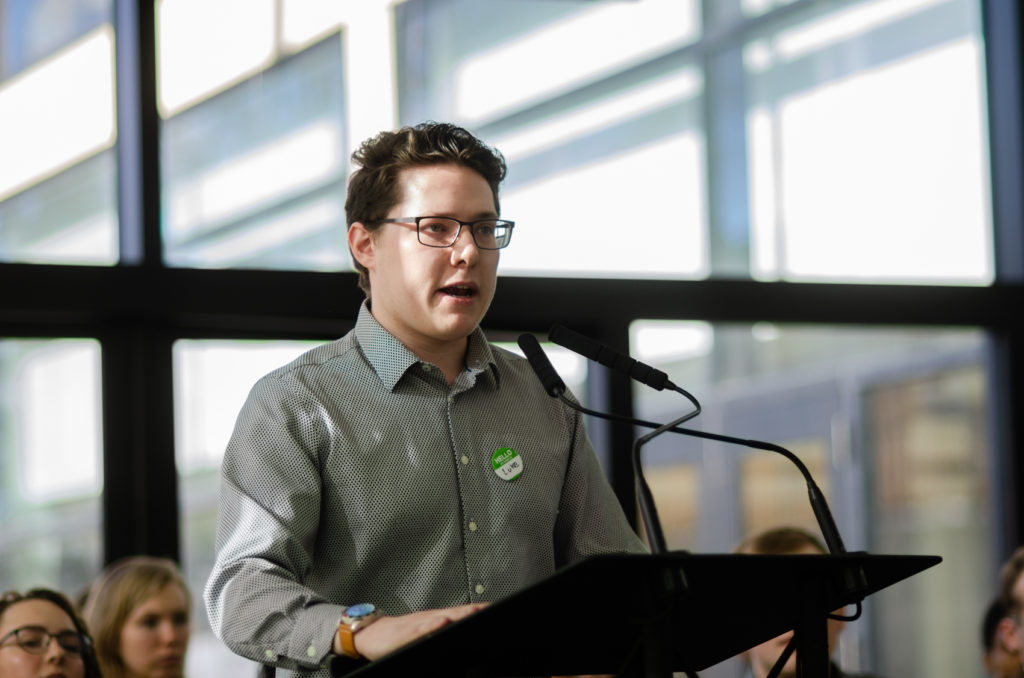
Yiming Chen, third-year international student and current arts councillor on Students’ Council, said there are two aspects to mobilizing: the process of organizing and the process of gathering students. To address the latter, Chen said she would create a committee to address issues affecting students. For the former, Chen suggested creating an official document that lays out how to organize a protest.
“[The document] will include how we can stay focused and will also include assessment of the seriousness of the problem and the consequences of the problem,” Chen said.
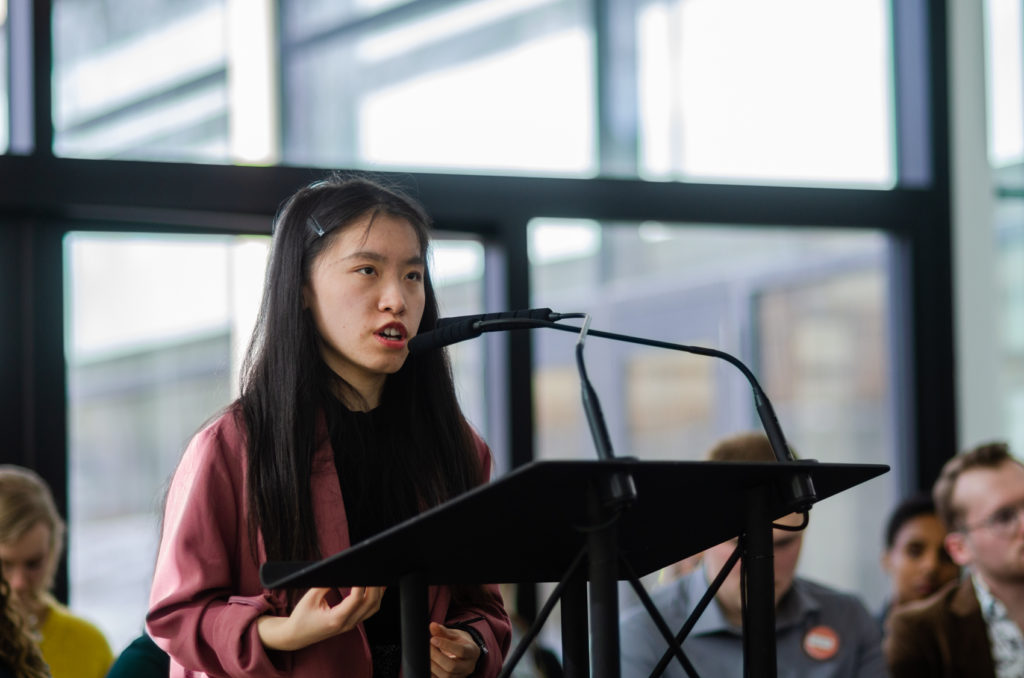
In the context of the Students’ Union’s hesitancy to attend the climate strike, candidates were asked how the would re-build student trust in their ability to organize.
Both Statt and Agarwal said they would look towards the Students’ Council to translate what kind of advocacy the general student body wants from the Students’ Union.
Chen, on the other hand, said student trust could be re-built by better advertising these kinds of events through SUTV and postering around campus.
— Khadra Ahmed
Making moves on addressing sexual violence on campus
Candidates were asked how they would ensure they aren’t putting the onus on victims telling their stories to get a sexual assault coordinator hired.
Talia Dixon, a third-year student double majoring in women’s and gender studies and political science and Students’ Council arts councillor, said that instead of using victim’s story, she would use grassroots movements, restorative practices to give RA’s proper training, and would ultimately hire a sexual assault coordinator.
Katie Kidd, a fourth-year student in secondary education and Students’ Council education councillor, said she had talked to survivors from Augustana who told her sharing their story was empowering and therefore she would not police who can and cannot tell their story. She also cited the effects her own words have already had.
“Since calling the dean of students out for ignoring this issue and not caring about it, he’s actually moved to hire two student care positions… to help sexual assault victims on campus,” she said. “Well, it’s not the goal that we want, but it is a win… I think we are already making winds.”
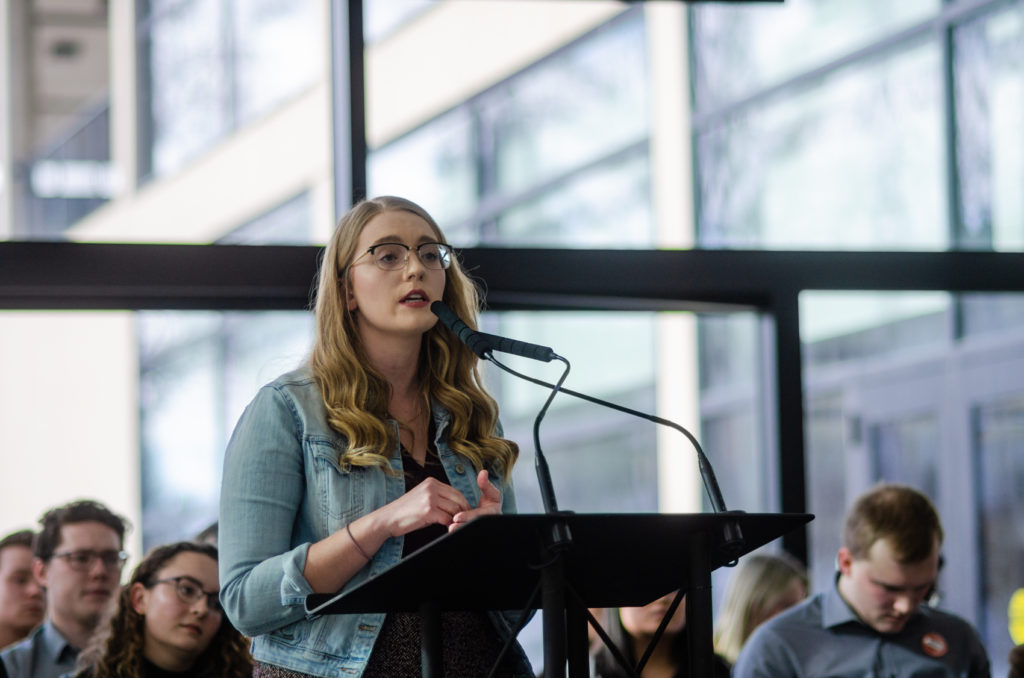
When asked how they would integrate sustainability into the vice-president (student life) portfolio, both candidates talked about the different approaches they would take.
Kidd talked about bringing more sustainable practices into residences, such as having biodegradable cleaning products, drying racks for clothes, and a waste monitoring system.
For Dixon, climate justice is something that should integrated into all aspects of students’ lives so they can live sustainably without having to think about it. She talked about creating a student-lead food coalition so students can choose vendors on campus that are not only healthy but also sustainable.
In her opening statement, Dixon also said that sustainability was key to reconciliation on campus.
“Climate justice is so much more than just the planet, it’s also about the people,” she said. “We will fight for reconciliation not only through the [Aboriginal Relations and Reconciliation Committee] recommendations, but through radical climate justice and it’s the only way we can decolonize this university… we can longer claim to be reconciling as long as we continue to disrespect this land.”
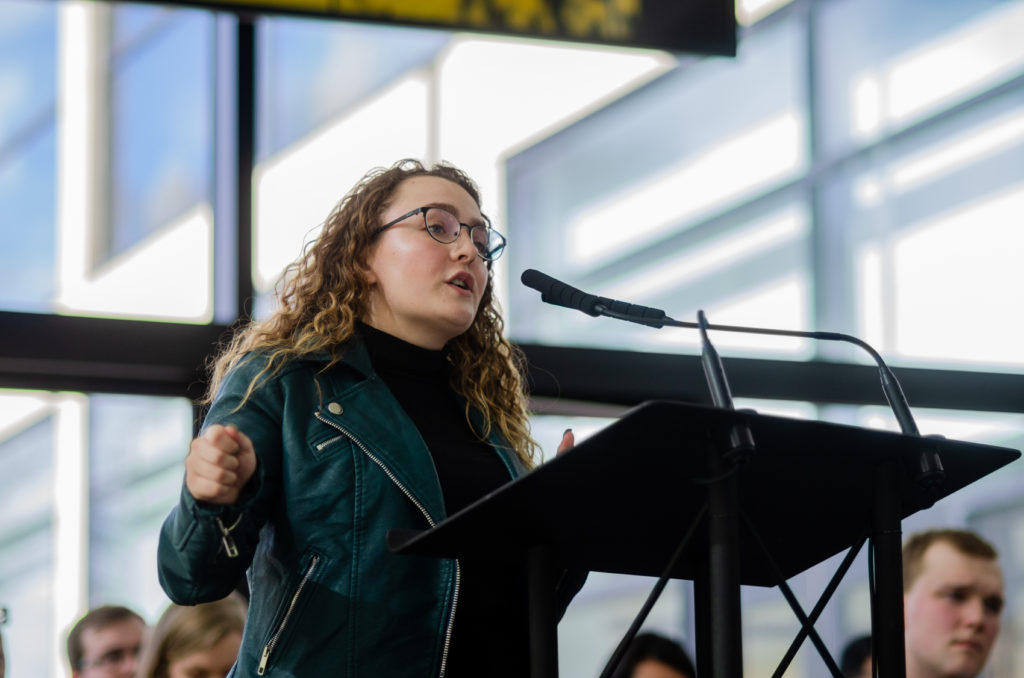
— Haley Dang
Exposing vulnerability and fighting for academic rights in the VP Academic race
Both vice-president (academic) candidates started the “Myer Horowitz” forum exposing the vulnerability of their positions.
David Draper, third-year honour political science and sociology student and arts councillor for Students’ Council, admitted that in his position, he won’t be able to address all student issues. However, Draper said that it’s about tackling small tangible points, something he said he revolves his platform around.
“No one person can solve every issue single issue,” he said. “Sometimes [leaving things] slightly better than when you found it is meeting achievable goals that make our lives easier.”
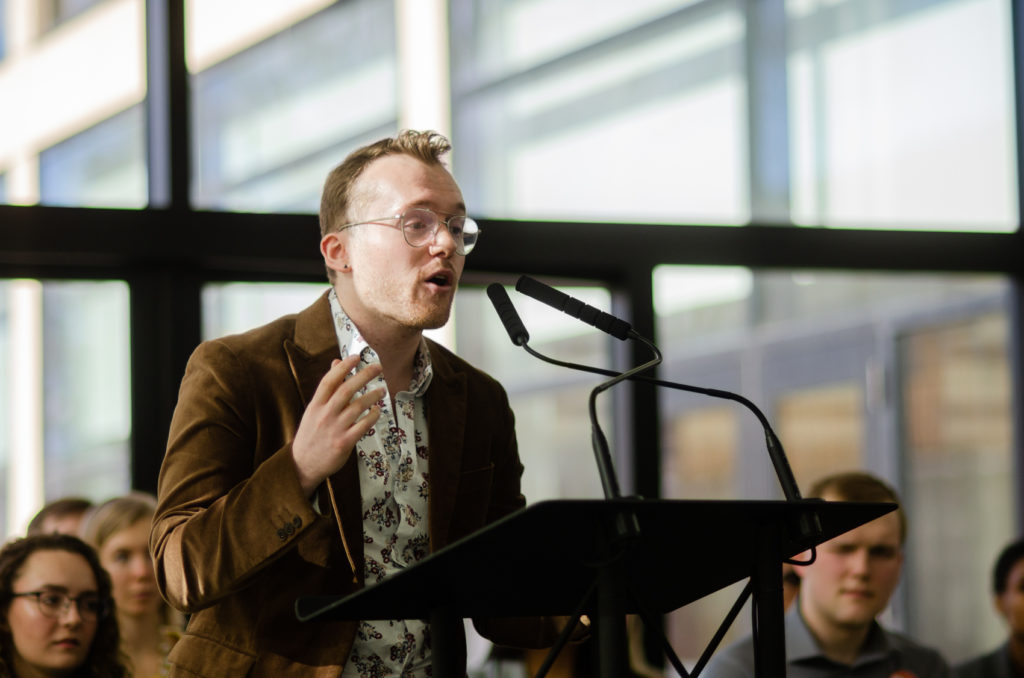
On a similar note, Eric Einarson, fourth-year chemistry student and president of the Campus Saint-Jean faculty association AUFSJ, said some students will always “slip through the cracks,” but that won’t stop him from trying to achieve his goals.
“I’ve heard that my goals are unrealistic,” Einarson said. “In a school of tens of thousands of people, people are going to slip through the cracks…. I can’t lie. Does that mean I shouldn’t try though?”
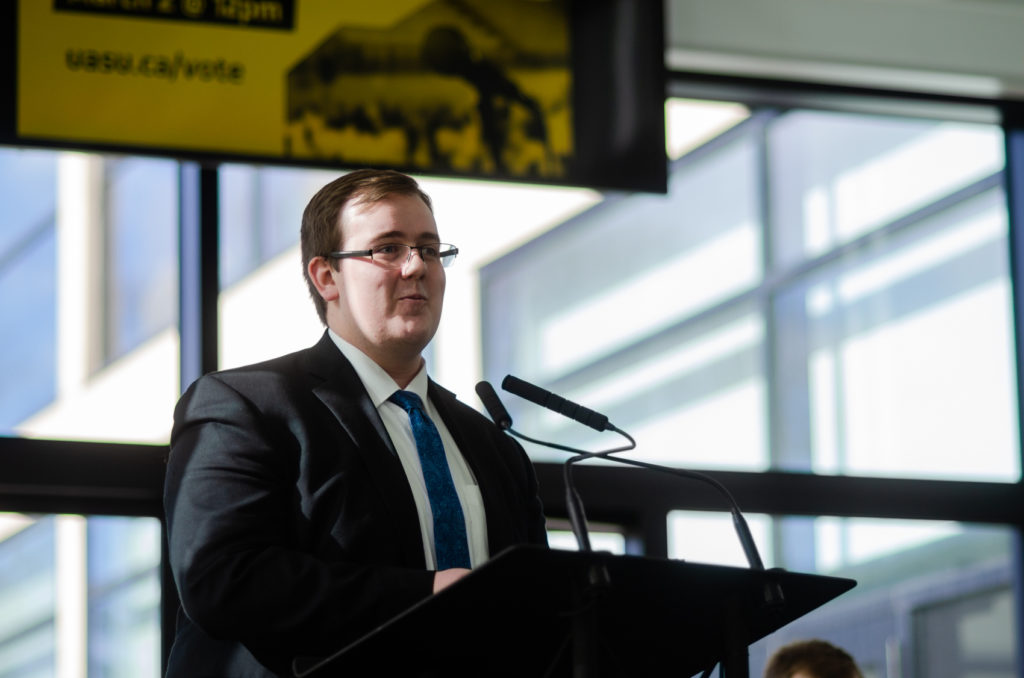
From the audience, candidates were asked how they would support students on satellite campuses such as Campus Saint-Jean, especially since students on these campuses struggle to finish their degrees.
As a student at Campus Saint-Jean, Einarson said he understands the struggle and said it’s frustrating to feel “down-trodded constantly.” He said that he would challenge administration at Campus Saint-Jean to upkeep the quality of education, but would also push for creating an open academic-advising program that would allow students from satellite campuses to see North Campus advisors.
Draper said that alongside bringing this issue up to university administration, he would work to ensure that satellite campuses have their voices heard across all campuses. To do so, he said he would ensure that their seats “are always filled” on General Faculties Council (GFC) the university’s highest academic advising body, and Students’ Council are filled next year.
Current Students’ Union vice-president (student life) Jared Larsen asked how the candidates would ensure professors provide materials for the Students’ Union exam registry, a service that allows students to see past exams for their courses.
Draper said that he was surprised that a majority of his classes don’t provide materials for the registry and said he would work to keep the university accountable to its own policies by bringing the currently in progress Charter of Student Rights to the university.
Einarson emphasized the fact that professors must provide representative testing materials for exams that are worth a certain percentage. He said he would work with the GFC Committee on the Learning Environment to include student services like the exam registry in syllabi.
— Khadra Ahmed
VP Ops-Fi candidates discuss mental health and student involvement in SU operations
The vice-president (operations and finance) candidates spoke mainly to their platforms and were again pressed for their plans to support mental health initiatives on campus.
Alana Krahn, fourth-year business economics and law student, opened by mentioning the need for the Students’ Union to become financially independent so it can maintain its services despite fluctuating government funding.
“When our services offered by the SU are threatened by the political climate, I will not stand by,” Krahn said. “I am trying to make the SU more economically sustainable.”
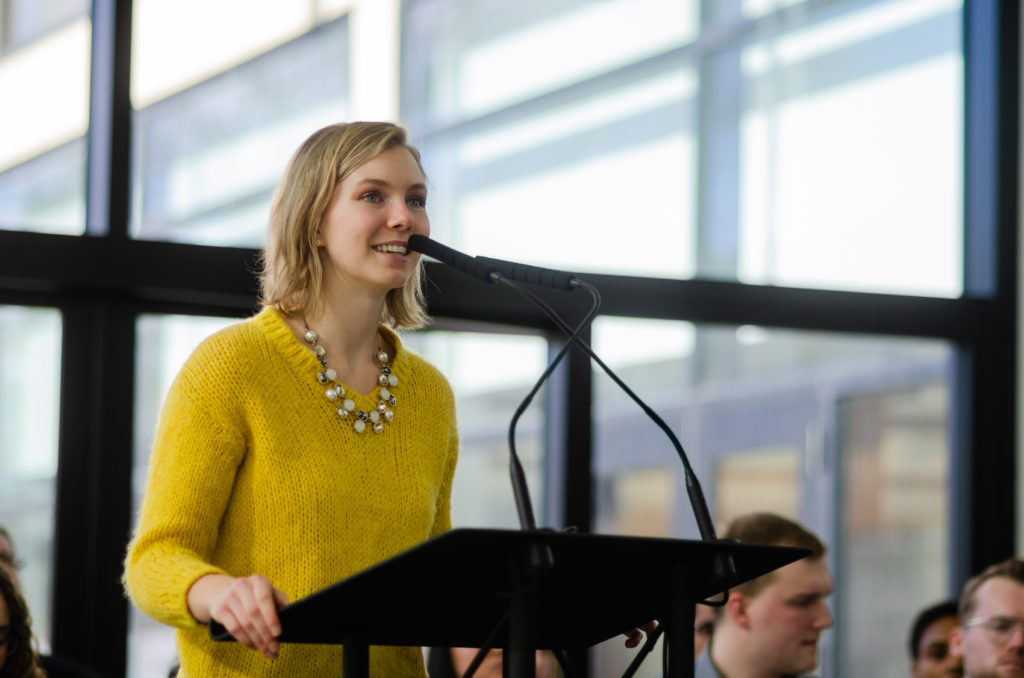
On a different note, Samantha Tse, third-year student in secondary education, Students’ Council audit committee chair, and education councillor for Students’ Council, spoke to her plan to improve the SU’s job and volunteer directories. She expressed frustration at the short time periods for job postings and how volunteer opportunities on the current directory were mainly advertising for volunteer opportunities abroad. Tse also pointed out that there is a possibility for the directory to advertise open General Faculty Council seats to invite more students to speak on the council.
“Whatever your passion is, whether its sustainability, advocacy in leadership or creativity the SU has an opportunity for you,” Tse said, “I want you to be connected to the job opportunities and volunteer opportunities the SU has to offer you.”
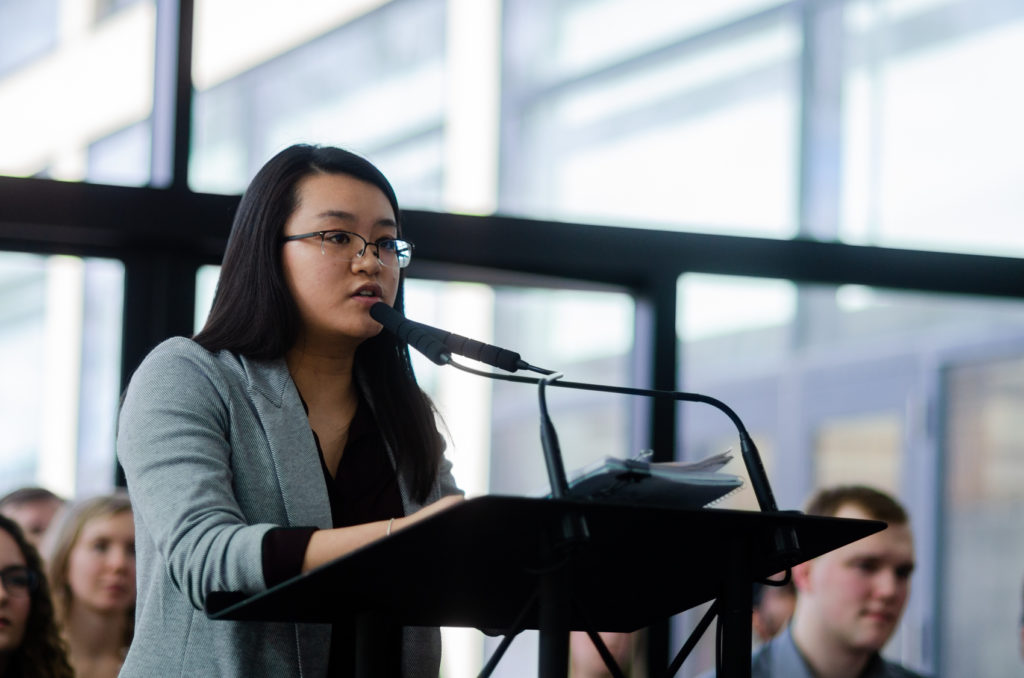
When asked how candidates would support mental health on campus, Krahn pointed to extending the Students’ Union health coverage to make things like counselling services more affordable. Tse said a lack of student awareness about mental health services was a major barrier to students’ access and suggested looking to improve this communication gap before looking elsewhere to solve the issue.
Students’ Council science Councillor Adarsh Badesha asked via livestream how candidates planned on involving students at- large in operations of SUB and Students’ Union services.
In response, both candidates highlighted the need to involve the Business Advisory Group — an initiative created by current vice-president (operations and finance) Luke Statt this year, in order to get feedback on the operation of Students’ Union businesses. Tse additionally called for working with Students’ Union vice-president (academic) to get feedback for businesses like Deweys and RATT.
— Olivia DeBourcier
Vice-president (external) race focuses on protests and working with different external organizations
In the first question from the audience, current vice-president (external) Adam Brown talked about how the Alberta Union of Provincial Employees at the University of Calgary and the Mount Royal Faculty Association both voted in favour of tuition increases. He asked candidates how they expect the Students’ Union to work with those organizations who are not supportive of students.
Rowan Ley, fourth-year political science student and current Board of Governors representative, said there are groups that they disagree with on many things, but that he will never sacrifice student values to become better allies. He added that there are places they can find to collaborate on while agreeing to disagree on some issues.
“Alliances are never perfect, but we should be willing to accept imperfect alliances rather than no alliances at all, while making sure we stay true to our values,” he said.
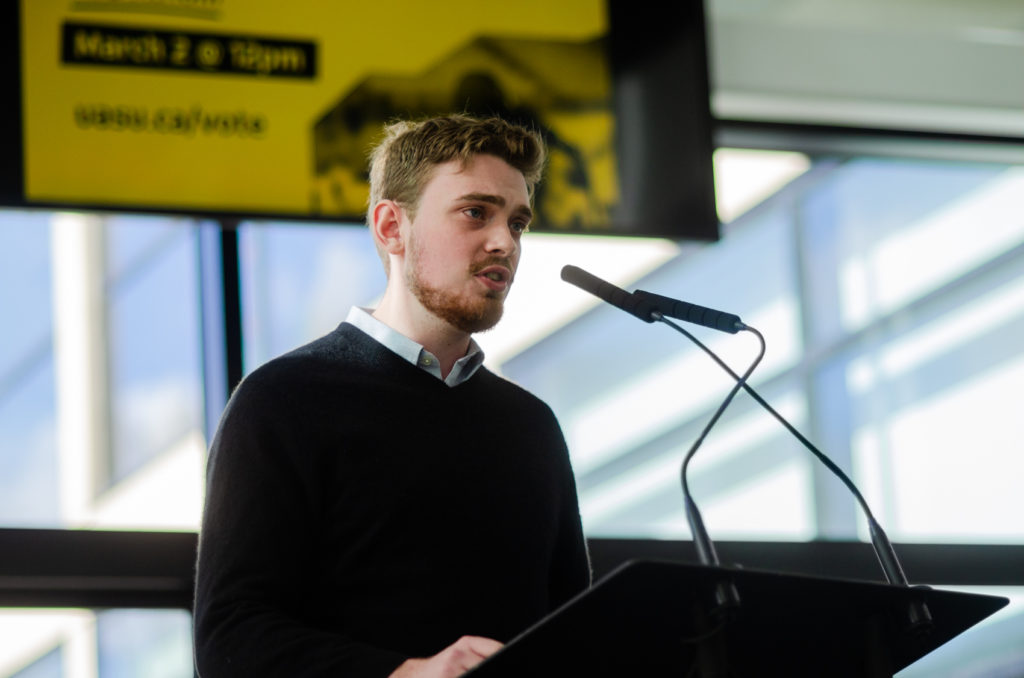
Robert Bilak, fourth-year political science student and speaker of Students’ Council, said that there are groups that don’t see the needs of students as important as the Students’ Union does. He said that when they can work with these groups, they should, but if they are unable to work with them, they should use the Students Not Silent movement to represent students.
“Students across the province don’t want increased tuition, yet if someone else is talking about increasing it or advocating to increase it, we need to begin advocating for those students ourselves through the Students Not Silent movement instead of giving up on them,” he said.
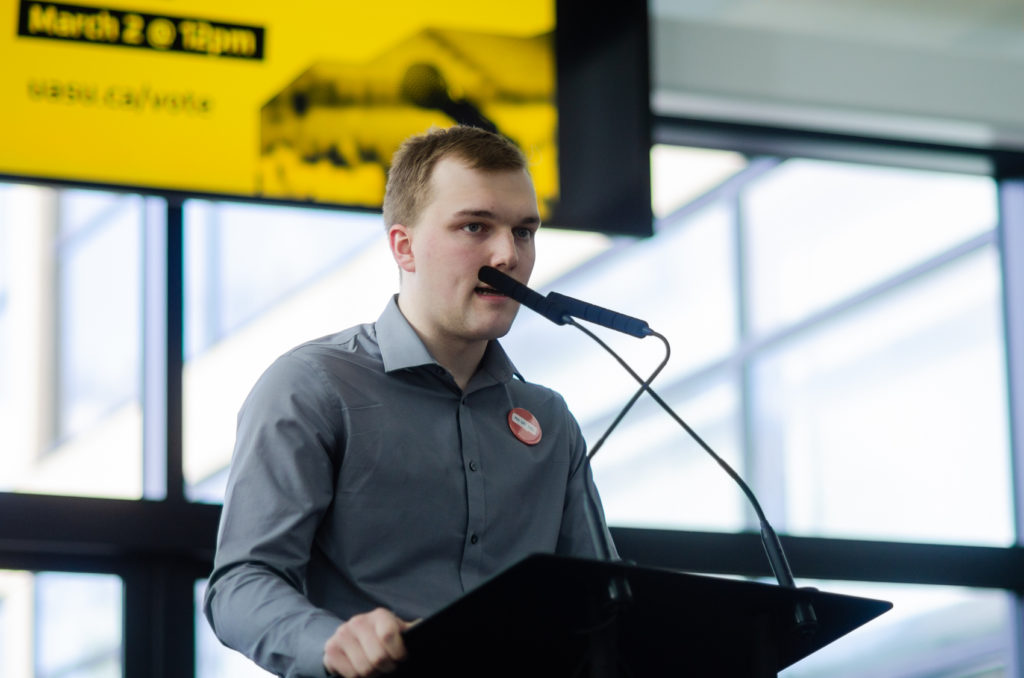
In another question, Jared Larsen, the current vice-president (student life) of the Students’ Union, talked about how the Council of Alberta University Students (CAUS) board will be all male and mostly white come next year. He asked candidates how they will ensure equity, diversity and inclusivity, as well as how Indigenization will be at the forefront of their priorities.
Bilak said he would like to see CAUS have a truth and reconciliation strategic plan that would go through the Truth and Reconciliation Commission’s (TRC) calls to action to see how well they are implementing them. He would also want to see them hire an Indigenous research coordinator, to look at how close Alberta is to “fully” implementing all of the TRC’s calls to action for post-secondary education.
“I think that CAUS has a unique opportunity to ensure that the Government of Alberta it doing the most it can when it comes to making sure that Indigenous issues are being taken seriously, and that the TRC calls to action are being done in Alberta, as well as at all the universities,” he said.
Ley said he would support the hiring of an Indigenous researcher to create a truth and reconciliation policy for CAUS to present to the provincial government.
“This is something that has been asked at Students’ Council for two years in a row, that CAUS has repeatedly, embarrassingly failed on,” Ley said. “This should be uncontroversial, and anyone running in this election should absolutely be committing to do that as one of the first things that they did at CAUS.”
He added that it’s also important to talk about how Indigenous students want to be represented to the provincial government while also giving Indigenous students the opportunity to speak for themselves.
Candidates were also asked what they would do differently to make protests more effective.
Bilak said protests should be held “immediately prior” to a budget, so the government knows that they are ready to act, possibly influencing the government to change the budget before it’s released.
He added that they could be better understanding what’s happening at the grassroots level. He would also work with various groups on campus to get a better understanding of what they want. He added that they should have a “clear” ask with the movement.
Ley said they should look at points in the budget cycle where decisions are being made. He would try to identify when the provincial Treasury Board, for example, is going to be allocating funding for advanced education, which would “likely come several months before the budget.”
He added that he wants the Students Not Silent movement to be run democratically, so people are able to collaborate and decisions are more consensus-based. He said that efforts should also be coordinated around the province to send a stronger message.
— Kate Turner
BoG rep candidates address their back-up plans if BoG is not receptive to their plans
Albert Hu’s campaign manager asked the BoG candidates about what their back-up plans are in case the Board of Governors (BoG) decided to override their platform since BoG operates on a voting system without guarantees for students.
Albert Hu, third-year medical student in the Doctor of Medicine (MD) undergraduate professional program, reiterated that he would not increase tuition during his term. One solution, though he “doesn’t like [it],” would be to start downsizing.
“I think the university has been talking about that for many years now,” he said. “We will cut enrolment if I have to. This is not what I want to do, but that’s how adamant I am about not increasing tuition during my term.”
Hu added that he will hold the administration accountable for raising money for the endowment and the annual operation funds. This, he said, is how they will grow the endowment while using the income.
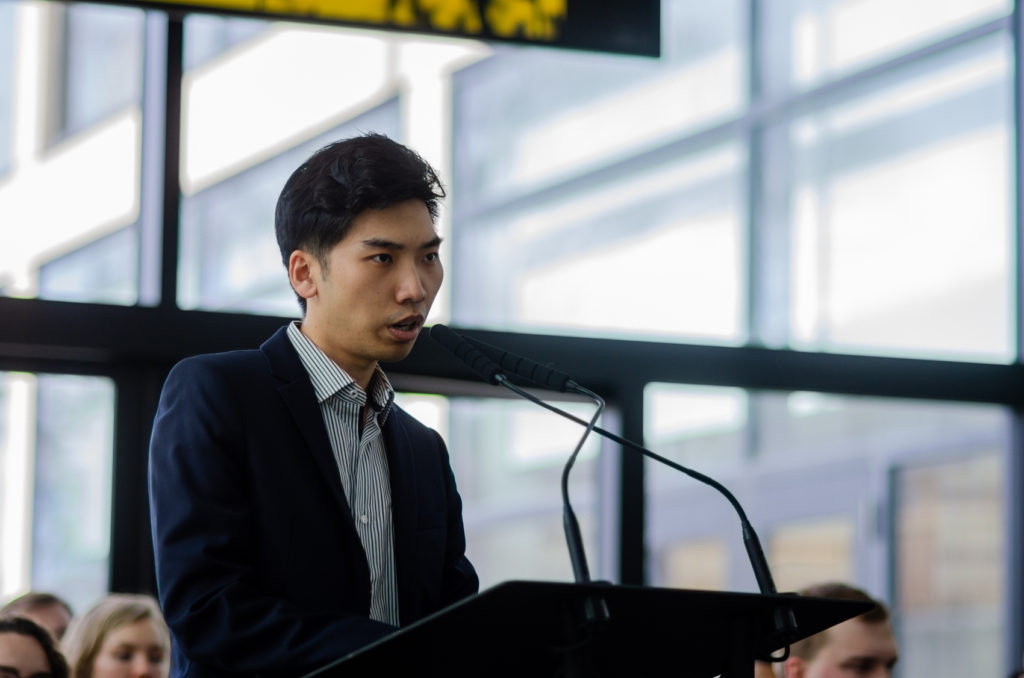
Dave Konrad, second-year bachelor of environmental and conservation sciences student majoring in human dimensions of environmental management and ALES councillor on Students’ Council, talked about restructuring the administration and re-centralizing it, as well as asking the province for money.
“Although it’s been said to be naive, the nature of advocacy is that we are bold and hopeful in the face of rejection,” he said.
He also talked about federal funding, and looking into mandatory fees, especially where there are duplicate services.
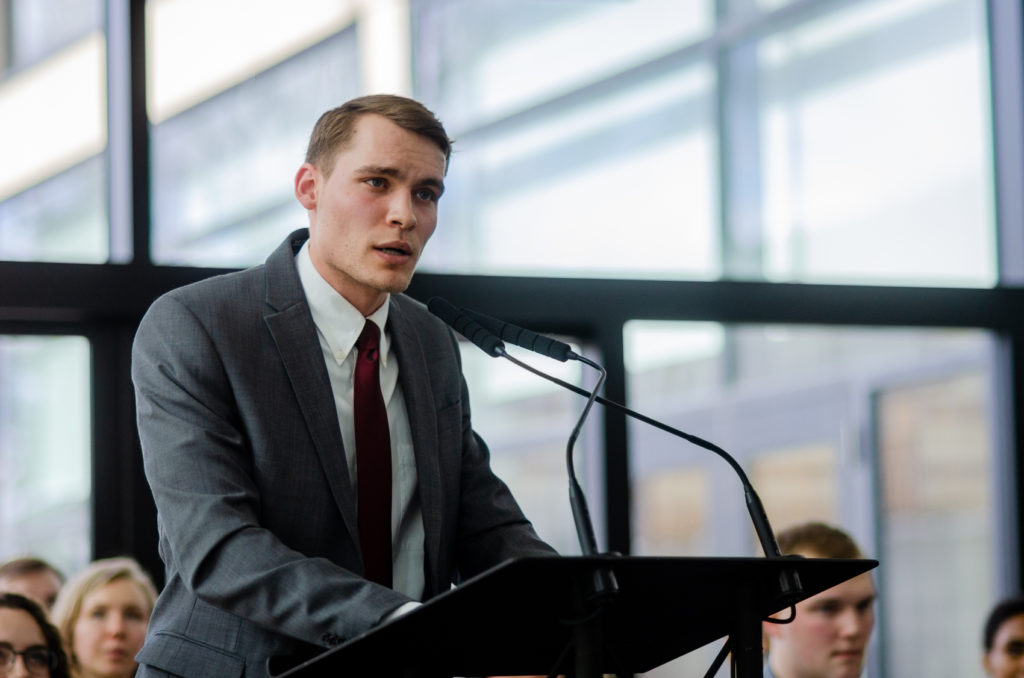
He also mentioned that endowment is a “small” fund that is “given with parameters” and rules, and said if they were to spend all the money they get on the return, the fund will run out. He added that he’s not saying BOG can’t use it, but he would advocate for using “small amounts” as to not lose it.
— Kate Turner

